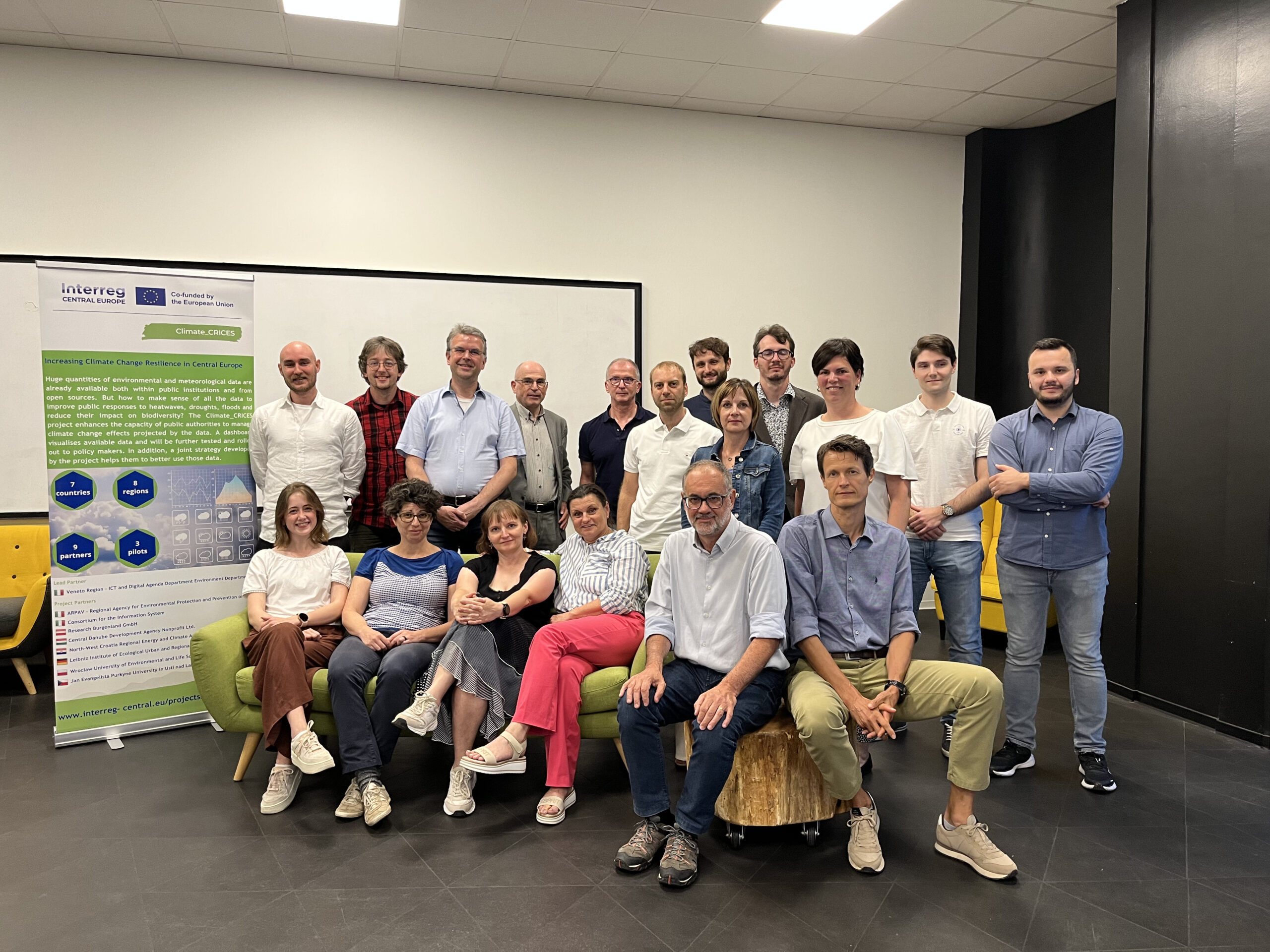Between July 9-10 2025, partners of the CLIMATE_CRICES project convened in Zagreb, Croatia, for a two-day meeting hosted by local project partner, REGEA. This gathering marked a key milestone for the project, providing a forum to review progress, strengthen coordination, and prepare for the next phase of pilot actions and stakeholder engagement across Central Europe.
Day 1: Aligning Strategy, Tools, and Community Engagement
The first day of the meeting centered on technical work package updates and strategic planning. Discussions highlighted the strong progress made in the initial phase and clarified priorities as the project moves toward more hands-on, regional level implementation.
The day began with a comprehensive review of Work Package 1 (WP1), led by IOER. Partners examined overall achievements, acknowledged deviations, and proposed adjustments to improve delivery. The discussion underscored the importance of flexibility and cross-partner learning as we address diverse local contexts.
Next, CSI presented the current status of the Climate_CRICES dashboard, a central tool designed to support decision-makers in visualizing and interpreting local climate risks. The session focused on usability, integration of pilot site data, and future enhancements. Partners agreed on next steps to ensure the dashboard becomes an accessible and practical asset for both municipalities, regional and national authorities and stakeholders.
Building on findings from Activity 1.2, UPWR guided a discussion on stakeholder engagement strategies in preparation for Work Package 2 (WP2). The session emphasized inclusive, place-based engagement approaches that build on local knowledge and foster co-ownership of climate adaptation measures.
The afternoon session focused primarily on shaping the content and functionality of the Climate_CRICES dashboard, with UPWR leading a detailed discussion on the types of data, indicators, and visualization features that will support both local decision-makers and project partners in the pilot phase. Partners shared insights into what information is most useful for adaptation planning, ensuring the dashboard reflects real-world needs across diverse urban contexts.
While the pilot actions were briefly discussed in terms of general planning and sequencing, the emphasis remained on aligning the dashboard’s capabilities with the upcoming implementation needs. The session helped establish a clearer understanding of how the dashboard will serve as a practical tool during pilot activities and beyond.
Day 2: Operational Readiness and Communication for Impact
The second day of the meeting was dedicated to strengthening operational coordination and developing impactful communication practices.
CDDA led a dynamic session on how to strategically align project communications with upcoming activities. The emphasis was on moving beyond visibility to create meaningful engagement—translating complex pilot outcomes into accessible narratives that inspire local action and regional learning.
The Lead Partner team presented updates on project management, financial reporting, and timeline adjustments. Partners reviewed shared responsibilities, deliverable timelines to ensure smooth progress throughout the second year of implementation.
Field Visit: Exploring Urban Climate Resilience in Zagreb
As part of the meeting, partners took a guided walking tour of Zagreb to explore the city’s approach to climate resilience. The tour highlighted Zagreb’s layered urban development—from its 19th-century historic core and the iconic Green Horseshoe to the green-buffered neighborhoods of New Zagreb. Participants observed how the city is addressing challenges like urban heat, flooding, and extreme weather through expanded green spaces, resilient vegetation, and adaptive planning. The visit ended with a symbolic uphill walk, reflecting the ongoing journey cities face in balancing heritage, resource management, and climate adaptation.
Looking Ahead
As the Climate_CRICES project transitions from research and planning to implementation and impact, the Zagreb meeting demonstrated the value of transnational collaboration. Each partner brings unique expertise, whether in scientific analysis, stakeholder engagement, urban policy, or communication. Together, these strengths are shaping an integrated, place-based approach to climate resilience that can serve local and regional authorities adaptation to climate change in Central Europe.
The lessons learned in Zagreb will now be taken forward into the pilot phase, where project partners will co-design and test climate solutions on the ground—bridging the gap between strategy and action.
